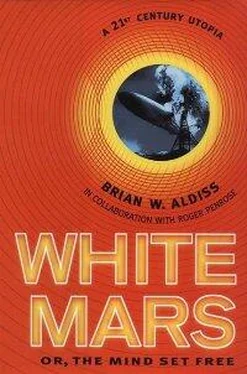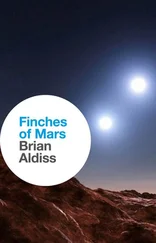Brian Aldiss - White Mars
Здесь есть возможность читать онлайн «Brian Aldiss - White Mars» весь текст электронной книги совершенно бесплатно (целиком полную версию без сокращений). В некоторых случаях можно слушать аудио, скачать через торрент в формате fb2 и присутствует краткое содержание. Год выпуска: 1999, ISBN: 1999, Издательство: Little, Brown UK, Жанр: Фантастика и фэнтези, на английском языке. Описание произведения, (предисловие) а так же отзывы посетителей доступны на портале библиотеки ЛибКат.
- Название:White Mars
- Автор:
- Издательство:Little, Brown UK
- Жанр:
- Год:1999
- ISBN:0-316-85243-0
- Рейтинг книги:5 / 5. Голосов: 1
-
Избранное:Добавить в избранное
- Отзывы:
-
Ваша оценка:
- 100
- 1
- 2
- 3
- 4
- 5
White Mars: краткое содержание, описание и аннотация
Предлагаем к чтению аннотацию, описание, краткое содержание или предисловие (зависит от того, что написал сам автор книги «White Mars»). Если вы не нашли необходимую информацию о книге — напишите в комментариях, мы постараемся отыскать её.
White Mars — читать онлайн бесплатно полную книгу (весь текст) целиком
Ниже представлен текст книги, разбитый по страницам. Система сохранения места последней прочитанной страницы, позволяет с удобством читать онлайн бесплатно книгу «White Mars», без необходимости каждый раз заново искать на чём Вы остановились. Поставьте закладку, и сможете в любой момент перейти на страницу, на которой закончили чтение.
Интервал:
Закладка:
Euclid: “You are being anthropocentric and trying to prove you are better than I.”
“I am better than you, Euclid. I can switch you off.”
“Well, what has all this to do with smudges?”
“The mind is a product of the brain, our physical brains, so that mind depends on the physics of our brains. We need to know that physics just a little better. As we shall do when the Omega Smudge reveals all. Shall we soon be able to reproduce mind artificially? Smudge is clearly central to these questions.
“Here I need to retire to relax my throat for five minutes. I shall return to answer your questions.”
He motioned me to follow him, and he, I and Euclid trooped off the platform to general applause.
His performance had converted me from mistrust to admiration. “A brilliant exposition,” I said, as we went into the rest room. “You must have enlarged the understanding of—”
“Those fools out there!” he exclaimed. As he spoke, he turned the lock in the door behind his back. “What did they understand? It was all gobbledy-gook to them. They show no inclination to learn. I’m not going back. I came over here to see you, you minx, and now I’m going to have you!” As he spoke, he was tearing off his overall. His face entirely altered from one of philosophical contemplation to a mask of lust and determination, its lines working angrily.
Never had I seen a man change so rapidly. I dreaded to think what thoughts he had been storing up in his mind during his long disquisition.
“Look, Jon, let’s just talk—”
“You’re going to be my payment—”
He tore from his pants the instrument with which he intended to rape me. I regarded it with interest. It differed from a dog’s pizzle, mainly in having a padded bulb at the top for comfort during the penetration. This must have been, I thought, an evolutionary development tending towards producing better relationships between the sexes. Nevertheless, although I admired the design, I could not conceive of having it in my body.
Or not without a lot of consideration.
Making some absurd compliments about it, I took hold of the thing and began to stroke it. Thorgeson’s “No, no, no,” turned quickly to “Oh oh oh,” as I hastened my strokes. I moved aside as he ejaculated on the floor.
All the while this embarrassing episode was taking place, Euclid stood there, smiling his blank smile. I ran past him, unlocked the door, and rushed into the passage.
12
The Martian marathon was organised by a group of young scientists working on Operation Smudge. They had set an ingenious 6-kilometre course through the domes, parts of which involved them leaping from the roofs of four-storey buildings, equipped with wings to provide semi-flight in the light gravity.
The marathon was regarded as an excuse for fun. Beza and Dayo had teamed up to provide a little razmataz music. Over 700 young people, men and women, together with a smattering of oldsters, were entered in the race.
Many appeared in fancy dress. The Maria Augusta dragon was present, with several small offspring. A bespectacled and bewigged Flat Mars Society showed up. Many little and large green men, complete with antennae, were running alongside green semi-naked goddesses, jostled by other bizarre life forms.
Everyone not in the race turned out to watch. The music played. It proved an exciting occasion. First prize was a multi-legged dragon trophy, created in stone and painted by our sculptor, Benazir Bahudur, with less elaborate versions for runners who came second and third.
The winner was the particle physicist Jimmy Gonzales Dust. He finished in 1,154 seconds. He was young and good-looking, with a rather cheeky air about him; he was very quick with his answers. At a modest banquet held in his honour, he was reported to have made a remarkable speech. Feeling somewhat dizzy, I did not attend.
Jimmy said that he had once believed that the process of terraforming the planet should have been undertaken from the start of our tenure of Mars. There could be no ethical objection to such work, since there was no life on Mars that would suffer in the process.
He went on to say that the duration of life on Earth was finite. The Sun in senescence would expand until it consumed Earth and the inner planets. Long before that, Earth would have become untenable as an abode of life and the human race would have had to move on or perish.
He claimed that other ports of call—the phrase was Jimmy’s—awaited. In particular, he pointed out, it was common knowledge that the satellites of Jupiter had much to offer. Whereas the hop from Earth to Mars was a mere 0.5 astronomical units on average, a much greater leap was required to reach those Jovian satellites—a leap of 3.5 AUs. Once humanity grew away from the corruption that dogged great enterprises to devise a better mode of propulsion than the chemical fuel presently used—or not being actually used, he added, to laughter—this leap would be less formidable and would prove to be nothing compared with that leap that would surely have to be made one day, the leap to the stars themselves.
Such a leap, he continued, would be undertaken within a century. Meanwhile a great engineering project, such as that which would be required to endow Mars with a breathable atmosphere at tolerable atmospheric pressure and within acceptable temperature tolerances, would attract the populations of Earth. It would provide the inspiration to look outward and to grasp that factor which, apparently, many found insurmountable—namely that, with labour equivalent to the labour which had gone to make Earth habitable for multitudes of species, many varieties of bodies could be provided with pleasant dwelling places.
Eventually, like a flock of migratory birds, terrestrial species would have to leave an exhausted Earth and fly elsewhere. Their first resting points could well be on those moons of Jupiter, Ganymede and Callisto in particular. They would have the vast water resources of Europa to draw upon, and their extraordinary celestial scenery to marvel at. Thus technology would help to achieve the apotheosis of humanity.
At this point, someone interrupted the speech, shouting, This is all political rhetoric!”
It is never wise to barrack a popular young hero. The banqueters booed, while Jimmy said, smilingly, “That certainly wasn’t a politic remark,” and continued with his talk.
However, he said, his ambition to see Mars terraformed—often referred to as a first step towards humanity’s becoming a star-dwelling race—had been based on a mistaken assumption, about which he wished to enlighten his audience, he hoped without alarming them.
Certainly, he had some disturbing news.
“For many years, people believed Mars to be inhabited,” he said. The quasi-scientific opinions of Percival Lovell, author of Mars as an Abode of Life, encouraged interest in the idea, which had been founded on the erroneous assumption that Mars was a more ancient planet than Earth. Improved astronomical equipment, and visits by probes, had swept all such speculation away. Finally, with manned landings, the point had been conceded. There was no life on Mars.
“Millions of years earlier, some archebacteria developed. Conditions deteriorated. They died out. Since then, everyone believed, Mars had been destitute of life. Destitute for millions of years.”
Jimmy paused, to confront the seriousness of what he was about to say.
That is not the case. In fact, for millions of years there has been life on this planet. You will know of the white tongues which surround our laboratories. They are neither vegetable nor mineral. Nor are they independent objects. We have reason to believe they are the sensory perceptors of an enormous—animal? Being, let’s call it.
Читать дальшеИнтервал:
Закладка:
Похожие книги на «White Mars»
Представляем Вашему вниманию похожие книги на «White Mars» списком для выбора. Мы отобрали схожую по названию и смыслу литературу в надежде предоставить читателям больше вариантов отыскать новые, интересные, ещё непрочитанные произведения.
Обсуждение, отзывы о книге «White Mars» и просто собственные мнения читателей. Оставьте ваши комментарии, напишите, что Вы думаете о произведении, его смысле или главных героях. Укажите что конкретно понравилось, а что нет, и почему Вы так считаете.










